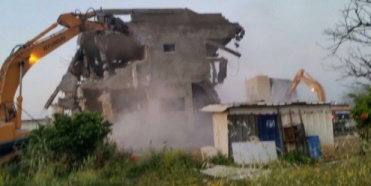Israeli authorities demolished, on Wednesday, two residential units in Jerusalem and Ramallah, as well as notified to demolish the house of a prisoner in Hebron, according to local and media sources.Local sources said, according to WAFA, that an Israeli police force accompanied by heavy machinery broke into Wadi al-Jouz neighborhood in Jerusalem before they proceeded to demolish a two-storey building that was under construction, citing construction without permission as a pretext for the demolition.
The demolished building, owned by the Totah and Totanji Palestinian families, included six apartments, and was designated to house around 70 members of both families.
Members of the Totah family said the Israeli municipality of West Jerusalem had offered to delay the demolition in return for a fine of 550 thousand shekels (about $140,000), a measure which they declined to comply with as they are unable to afford that sum of money.
Meanwhile, Israeli army demolished an agricultural structure in the village of Beit Our, to the west of Ramallah. Owner of the structure, Nabil Samara, said afew days ago he received a notice from the so-called Israeli Civil Administration saying the property was built on agricultural site, and that he had to consult with the administration.
When Samara consulted with the Administration as required, he was informed that there was no problem with the structure being built where it was. Samara added that he had a proper proof of ownership of the land on which the structure was built.
Issuance of construction permits for Palestinians living in Area C, under full Israeli administrative and military control, is strictly limited, forcing Palestinians residing in such areas to embark on construction without obtaining a permit to provide a shelter for themselves and their families, risking in the process having their homes demolished.
According to the United Nations Office for the Coordination of Humanitarian Affairs (OCHA), between December 30, 2014 and January 12, 2015, the Israeli authorities demolished 27 Palestinian structures in Area C of the West Bank and five in East Jerusalem, in addition to two self demolition incidents, due to lack of Israeli-issued building permits.
B’Tselem, an Israeli human rights group, estimated that from 2006 until 30 June 2015, Israel demolished at least 876 Palestinian residential units in the West Bank (not including East Jerusalem), causing 4,105 people – including at least 2,011 minors – to lose their homes.
In the meantime, an Israeli army force in Hebron raided the apartment of Maher Hashlamoun, a Palestinian who was accused of stabbing and killing an Israeli settler in November 2014.
According to tge Hashlamoun, the army notified his family and residents of the other apartments in the building of their intent to vandalize his apartment in retaliation for the murder of the settler.
B’Tselem maintains that punitive house demolitions flagrantly breach international law, which allows destruction of property only when necessary for a military operation.
“House demolitions are a clear case of collective punishment in that the primary victims are relatives of the persons suspected of committing an offense,” it says.

